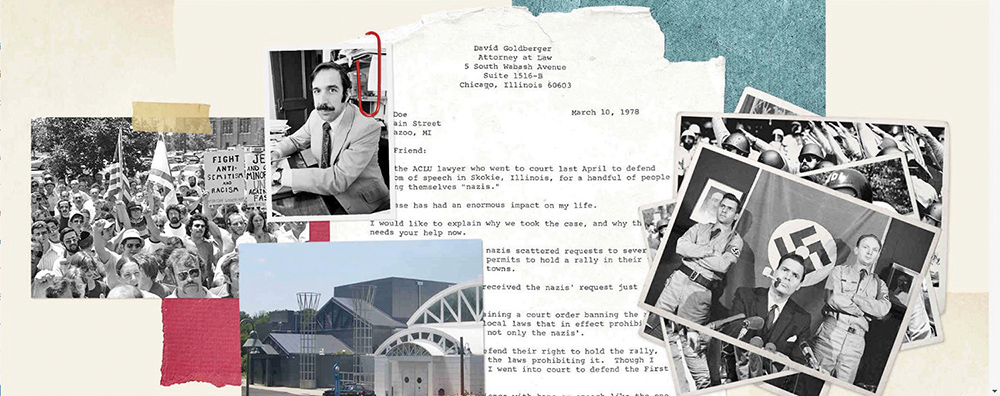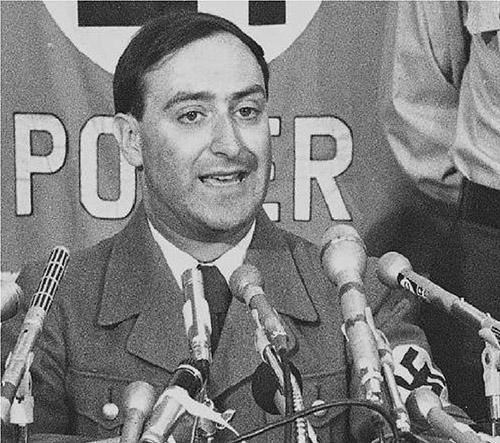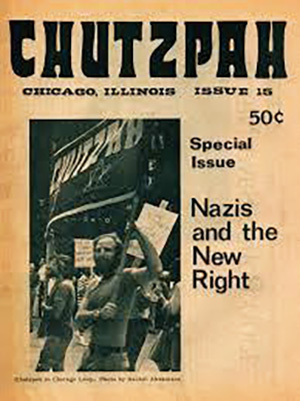
July 11th marked the anniversary of the Supreme Court’s decision to permit a march by neo-Nazis across Skokie, Illinois. The Skokie case is noteworthy for many reasons. In essence, it represents the fine line between upholding the First Amendment and allowing a heinous group fueled by hate speech to intrude on a community where many residents had already been victimized by hate. The balance between free speech and giving a platform to hatemongers is a very delicate one. In our time, with surging hate speech and hate crimes, the case of Skokie merits review.
In the fall of 1976, Frank Collin, leader of the National Socialist Party of America (NSPA), requested park permits to march his group, in full Nazi regalia, and replete with swastikas, across several North Chicago suburbs. Some of these suburbs, including Skokie, had substantial Jewish populations. The Village of Skokie, at that time, had about 40,500 Jewish residents; estimates put the number of Holocaust survivors in Skokie at about 7,000. They were among those who had also moved to the suburb when North Chicago neighborhoods were no longer “restricted” to Jews.
Collin’s intention of marching through Skokie seems strange at best, considering the likelihood of enormous opposition from residents and others. But ultimately, perhaps the most bizarre aspect of Collin’s leadership of a neo-Nazi group and the persona that he cultivated was that his father, Max Simon Cohn (or Cohen) was a German-Jewish survivor of Dachau. Clearly that irony was lost on Collin, as was the fact that he himself had previously been expelled from the American Nazi Party (later called the National Socialist White People’s Party) when his ancestry was exposed. Collin subsequently started the NSPA in reaction to his ejection from the more established American neo-Nazi party.

Collin’s group may have been small, but Collin had a penchant for creating publicity for it, and especially for himself. Could there have been a better way to generate controversy and the resultant press coverage than by marching through Holocaust survivors’ turf? Collin’s decision created a maelstrom of opposition, because although more than 20 years had transpired since WWII’s end, the threat of such a march re-awakened individual and collective trauma for many Skokie survivors. Their furious response to the ADL’s and others’ recommendation to “ignore them” was understandable. In many cases, in survivors’ various countries of origin, a decision to “ignore them” had only emboldened the Nazis and accelerated the path to Jewish destruction.
There were strong protest rallies, where Skokie residents were joined by Meir Kahana’s Jewish Defense League (JDL), left-wing activists, and other Jewish and non-Jewish groups. With the approval of Albert J. Smith, Skokie’s mayor, Village attorney Harvey Schwartz filed for two ordinances against the NSPA and ultimately, pressed the Illinois courts to issue an injunction to prevent the march.
Collin was initially barred by a police blockade from the route into Skokie. His response? He immediately appeared at the ACLU’s Chicago office and insisted that the latter champion his argument that the NSPA’s First Amendment rights—i.e., freedom of speech—were being violated.
It’s well known that any number of freedom-loving, liberal Jews work for, associate with, and support the ACLU. David Goldberger, lead counsel for the NSPA, was harshly criticized, even threatened, because of his decision to take the case. Major donors withdrew their funding from an organization that chose to defend neo-Nazis. Jew was pitted against Jew. JDL protesters even occupied the reception area of the ACLU’s office.
The case, on appeal, was heard in the Supreme Court, which ruled in favor of the NSPA marching through Skokie, The Court’s proviso was that swastikas, symbols evoking terror, could not be displayed. In the end, Collin decided to cancel the march, but he had Skokie, the legal system, and the ACLU (protecting the NSPA’s rights) dancing in circles.

What Collin did get was plenty of front-page publicity, which was likely his main goal from the start. He eventually faded from the public eye, changed his name, and penned books. He was further discredited when he was convicted of inappropriate behavior. The main takeaway from the case is how fine the line is between free speech and respect for human dignity.
The Skokie controversy was dramatized in a 1981 film, simply titled Skokie. It featured a primarily Jewish cast, Jewish producer, and Jewish director. Skokie was rebroadcast in 1985 on the UK’s Channel 4 as Once They Marched Through a Thousand Towns. The film rather accurately represented the issues at stake for Skokie’s government, its Holocaust survivors, for the ACLU. And let’s not omit the “outsiders,” Jews and non-Jews, who were horrified by the prospect of even a minor fascist resurgence by a publicity hungry splinter group. Reviews of the film, overall, were positive on both sides of the Pond. The UK perspective is interesting, given that it has no First Amendment (like every country, except for the US), and its laws against hate speech are even stricter than in the US.
Once again, with hate speech and hate crimes on the rise, the question arises as to how to protect the right of free speech without enabling those who would exploit it to rabble rouse and incite others to violence. A delicate balance indeed.
Sources:
ABC News: https://abcnews.go.com/US/skokie-legacy-nazi-march-town-holocaust-survivors/story?id=56026742
ACLU: https://www.aclu.org/issues/free-speech/skokie-case-how-i-came-represent-free-speech-rights-nazis
Chicago Tribune: https://www.chicagotribune.com/history/ct-vintage-tribune-nazis-skokie-20230122-vka6l2fxefgf5gcnmweshyqdxa-story.html
Jewish Currents. (1977). https://jewishcurrents.org/the-skokie-march-that-wasnt
The Museum of the Jewish Heritage: https://www.youtube.com/watch?v=n45z4etcuVw
Skokie. (1981). AKA Once They Marched Through a Thousand Towns
Rachel Kovacs is an Adjunct Associate Professor of communication at CUNY, a PR professional, theater reviewer for offoffonline.com—and a Judaics teacher. She trained in performance at Brandeis and Manchester Universities, Sharon Playhouse, and the American Academy of Dramatic Arts. She can be reached at mediahappenings@gmail.com.








